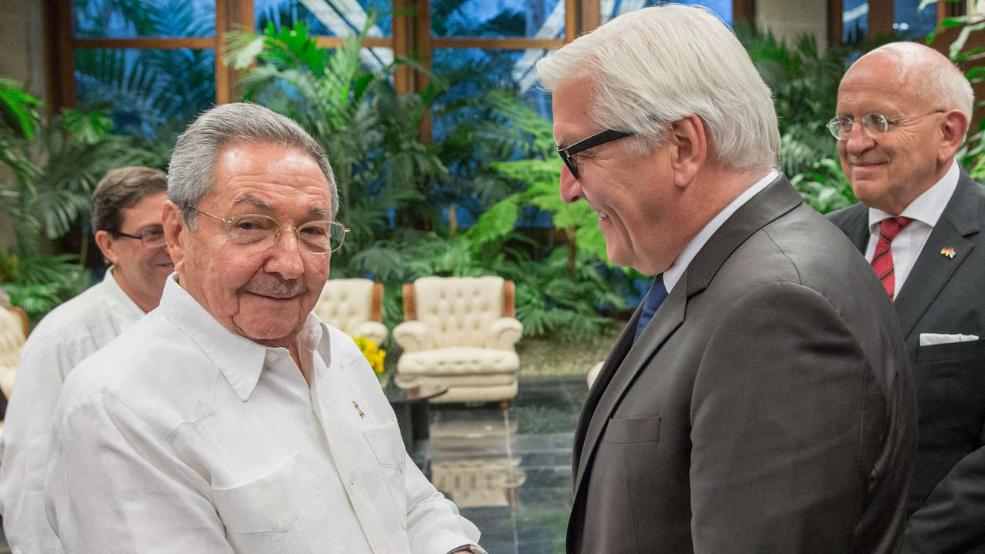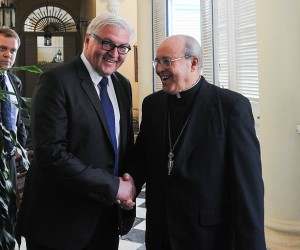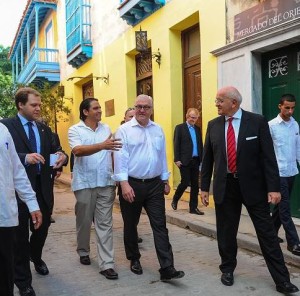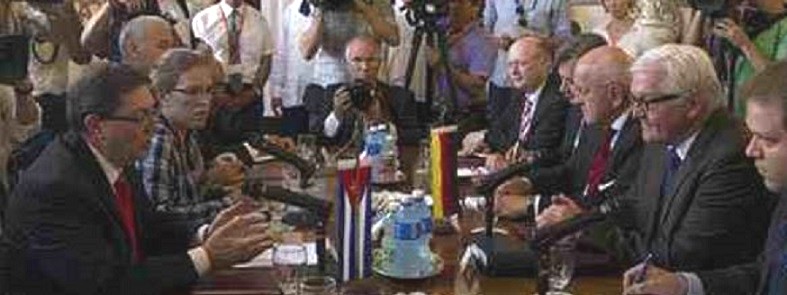
Top German diplomat arrives in Cuba, meets with Raúl Castro
Foreign Minister Frank-Walter Steinmeier arrived in Havana Thursday morning (July 16), the first German foreign minister to travel to Cuba in 25 years.
[For background in Progreso Weekly, click here.]
At the end of a busy day, Steinmeier was received by President Raúl Castro, a meeting that was not originally in the German visitor’s schedule. According to the daily Granma, “in a cordial environment, Raúl and Steinmeier stressed the importance of the first visit to Cuba of a foreign minister of that European nation and exchanged views on the broad potential for the development of bilateral relations, especially in the economic, trade and cooperation sectors.”

“Cuba and the world are edging closer together after a long period of mistrust,” Steinmeier had told Deutsche Presse-Agentur before leaving Berlin. “Between Cuba and many countries a new door has opened. It is a cautious opening at the end of a decades-long, sometimes agonizing standstill.”
After arriving, Steinmeier and his entourage toured Old Havana (in 86-degree heat), chatted with Cardinal Jaime Ortega y Alamino and met officially with Cuban Foreign Minister Bruno RodrÌguez Parrilla.
Speaking to German reporters after his arrival, Steinmeier said that Cuba was “in many ways uncharted territory for me personally. This is my first time in Cuba. But Cuba is also uncharted territory in our foreign policy. A German foreign minister has never been here, and in this respect we have an opportunity to review where we stand, now that years of alienation, silence, deep and dangerous conflict lie behind us.”
Steinmeier’s journey to Cuba represents the first time that a German foreign minister has traveled to Havana since Germany’s reunification in 1990. The trip is aimed at developing lasting bilateral relations between Berlin and Havana after Cuba recently took steps toward liberalizing its economy.

Political relations, cultural exchanges, and the intensification of economic relations are expected to be the subjects of discussion during his two-day stay. And, “of course, since we’re here, the issue of human rights cannot be excluded,” Steinmeier said.
“We have different opinions about the importance of human rights and the contents of democracy,” he went on, “but we must explore what can be done between us.”
Steinmeier’s agenda includes talks with four ministers, clergy, journalists, bloggers, artists, scientists and athletes.
Tourism is a major topic of conversation. Last year, 124,000 Germans visited Cuba, making them the third largest inbound group after tourists from Canada and Britain. That figure represented an increase of about 20 percent over last year.
“We’ll meet today with the Foreign Minister [Rodríguez], probably with the President, and in the course of today will sign a joint agreement on the principles of cooperation between Germany and Cuba,” the German diplomat said. “The mutual interest is there, yet there is a lack of legal basis which we urgently need in Cuba. Therefore, we will start talking about it today.”
In fact, at the ministerial encounter, two agreements were signed: one to open regular consultations between the two ministries and the other to expand cultural and economic exchanges.
“I think this is the right time to readjust our relations,” Steinmeier said after the meeting with Rodríguez.
Steinmeier’s trip comes just days ahead of Cuba and the United States reopening their respective embassies after President Barack Obama moved in December to end the 50-year standoff between the two nations by ordering the full restoration of diplomatic relations between Havana and Washington.
Steinmeier also met Thursday with Minister of the Economy Marino Murillo Jorge, with whom he discussed “the actualization of the Cuban economic model and the opportunities it provides for an expansion of trade between Cuba and Germany,” according to the Cuban news agency AIN.

The German visitor is scheduled to meet with Culture Minister Julián González, at which time Steinmeier is expected to propose the opening of a German cultural center in Havana, the Goethe Institute.
Top officials from the German Democratic Republic (GDR) used to travel to Cuba frequently; however, no ministers from West Germany visited Havana since Cuba’s communist revolution in 1959.
With the reunification of East and West Germany in 1990, the diplomatic freeze between Cuba and reunified Germany began to thaw. Former Economic Affairs Minister Werner Müller visited the Caribbean island nation in 2001.
Steinmeier is accompanied by a small delegation of business representatives. Trade between the two countries is still very limited. Cuba holds the 101st spot on the list of German export destinations and the 125th position for imports
Only 30 German companies and banks are represented in Cuba. Germany’s embassy in Havana is one of Berlin’s smallest.
At present, 18 member states of the European Union have concluded bilateral agreements with Cuba; Germany is not among them.



